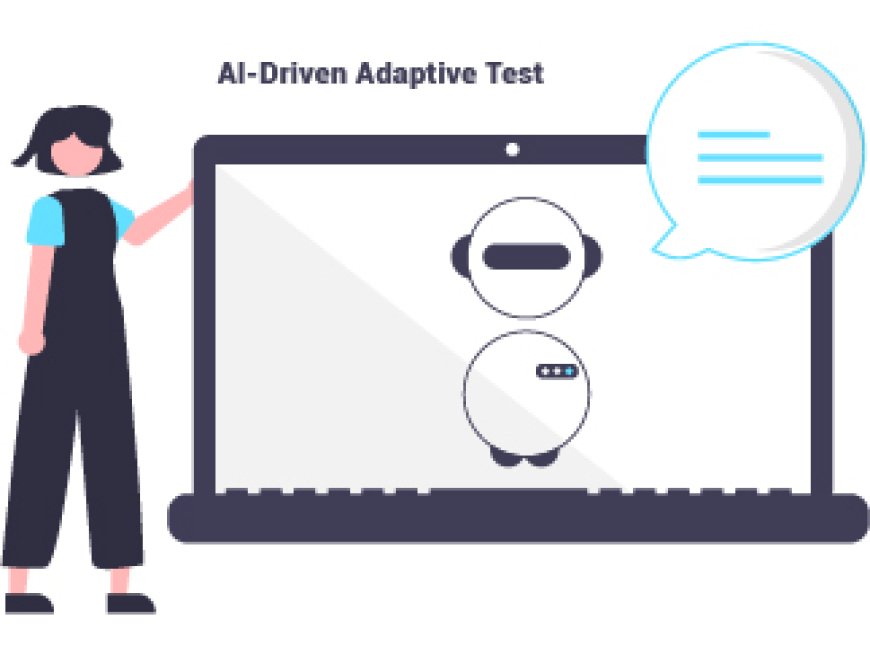Adaptive Testing use of AI Technology

Adaptive Testing use of AI Technology:
Adaptive testing is a form of assessment that uses artificial intelligence (AI) technology to tailor the questions and difficulty level of a test to the individual taking it. Unlike traditional testing methods, where every test taker receives the same set of questions, adaptive testing customizes the test based on the test taker's responses to earlier questions.
The adaptive testing process begins with a pool of questions with varying levels of difficulty. The AI algorithm selects an initial question based on the individual's known abilities and performance level, which is established by the answers to a few baseline questions. If the individual answers the initial question correctly, the AI algorithm selects a more challenging question. Conversely, if the individual answers incorrectly, the AI algorithm selects an easier question.
The process continues with the AI algorithm adjusting the difficulty level of the questions based on the individual's previous responses. The adaptive testing algorithm aims to optimize the test-taker's score while minimizing the number of questions needed to reach a reliable score.
Adaptive testing is used in various contexts, including education, certification exams, and job assessments. The advantages of adaptive testing include providing a more efficient and accurate evaluation of a test taker's knowledge and abilities, reducing test-taking time, and providing a more engaging and personalized experience for the test taker.
However, adaptive testing has some limitations. The initial questions chosen by the AI algorithm may not accurately reflect the individual's abilities, and the process may not capture the test taker's full range of knowledge and abilities. Additionally, adaptive testing requires significant resources to develop, validate, and maintain, which can make it more expensive than traditional testing methods.
Types of Adaptive Testing use in AI Technology:
There are different types of adaptive testing use in AI technology, which include:
1. Computerized Adaptive Testing (CAT): This is a type of adaptive testing that is commonly used in educational and psychological assessment. It is designed to provide a more precise and efficient measure of a test-taker's ability by adjusting the difficulty of questions based on their previous responses.
2. Online Adaptive Testing (OAT): This is a type of adaptive testing that is delivered online, allowing test-takers to take the test at their own pace and in a convenient location. OAT can be used for different types of assessments, including certification exams and employee training.
3. Adaptive Game-Based Learning: This type of adaptive testing uses game-based approaches to personalize learning experiences. It is designed to adjust the difficulty of the game based on the player's skill level, ensuring that they are always challenged enough to learn new concepts.
4. Adaptive Behavioral Testing: This type of adaptive testing is used to evaluate a person's behavior in real-world situations. It involves measuring an individual's response to a particular situation and then using this information to adjust the test's difficulty level based on their performance.
5. Adaptive Language Testing: This type of adaptive testing is used to measure a person's language proficiency level. It adjusts the difficulty of questions based on the test-taker's performance on previous questions, allowing for a more accurate measure of language proficiency.
Who is Discovered Adaptive Testing use in AI Technology:
I do not have the capability to determine who specifically discovered Adaptive Testing use in AI Technology. However, there are several companies and institutions that are actively involved in developing and utilizing this technology, including:
1. Knewton - Knewton is an education technology company that offers adaptive learning solutions for schools, universities, and educational publishers. They use AI and machine learning algorithms to personalize learning and assessment for students.
2. McGraw Hill - McGraw Hill is a publishing company that provides educational materials and services for both K-12 and higher education. They offer adaptive learning tools, including their Connect platform, which uses AI to provide personalized learning experiences.
3. Edmentum - Edmentum is an online learning company that offers a variety of solutions for K-12 education, including adaptive assessments and personalized learning paths. They use AI to analyze student data and provide targeted feedback and resources.
4. Duolingo - Duolingo is a language-learning platform that uses AI to provide adaptive assessments and personalized learning experiences. Their platform uses machine learning algorithms to identify areas where students need additional practice and adjust content accordingly.
5. ACT - ACT is a nonprofit organization that provides college readiness assessments and other educational services. They offer an adaptive testing platform that uses AI to personalize the test-taking experience for each student.
These are just a few examples of companies and institutions that are involved in developing and using Adaptive Testing use in AI Technology.
Working Process of Adaptive Testing use in AI Technology:
Adaptive testing is a process of conducting assessments that are customized to the ability of the individual taking the test. The technology works by using algorithms and artificial intelligence (AI) to dynamically adjust the difficulty level of questions based on the test-taker's responses.
The process involves the following steps:
1. Administration of Initial Test: The individual taking the test starts with an initial test to determine their proficiency level in a particular subject area.
2. Analysis of Responses: The AI system analyses the individual's responses to the initial test and creates a proficiency profile for the individual.
3. Selection of Questions: Based on the proficiency profile, the system selects the next set of questions to be presented to the individual. The difficulty level of these questions is determined based on the individual's proficiency level.
4. Continuation of Assessment: As the individual progresses through the assessment, the system continues to adjust the difficulty level of questions based on their responses.
5. Completion of Assessment: The assessment is complete once the individual has answered a predetermined number of questions or has reached a pre-determined proficiency level.
6. Reporting: The results of the assessment are then reported to the test-taker, teacher, or other stakeholders, providing insights into the individual's strengths and areas that require improvement.
Overall, adaptive testing allows for a more personalized and efficient testing experience, where the questions presented are tailored to the individual's proficiency level, reducing the time and effort required to achieve a reliable and valid assessment.
All Over Company Details & Information of Adaptive Testing use in AI Technology:
There are several companies that offer products and services related to adaptive testing and AI technology. Here are a few examples:
1. Knewton: Knewton is an education technology company that offers adaptive learning products and services to schools, publishers, and other education providers. Their adaptive learning platform uses AI to personalize learning for each student based on their individual needs and abilities.
2. Pearson: Pearson is a global education company that offers a range of products and services, including textbooks, assessments, and online learning tools. They use AI and machine learning to develop adaptive assessments that can adjust the difficulty of questions based on a student's performance.
3. Edmentum: Edmentum is an online learning company that provides curriculum, assessments, and other educational tools to schools and districts. Their assessment products use AI to provide personalized learning paths for each student based on their performance.
4. McGraw Hill: McGraw Hill is a learning science company that provides educational materials, assessments, and other products to K-12 schools and higher education institutions. They use AI and machine learning to develop adaptive assessments that can adjust the difficulty of questions based on a student's performance.
5. ExamSoft: ExamSoft is an assessment software company that provides tools for creating and administering exams in higher education and professional settings. They use AI to provide real-time analytics and feedback to students and educators.
These are just a few examples of companies that are using AI technology to develop adaptive testing products and services.
How We Can Learn Adaptive Testing use in AI Technology:
To learn about Adaptive Testing in AI Technology, you can start with researching the basics of adaptive testing and how it works. You can also look for online courses or tutorials on platforms like Coursera, Udemy, or edX that offer courses on adaptive testing or related fields such as educational technology and assessment.
Additionally, you can explore research papers and publications in academic journals that discuss adaptive testing and its applications in various fields. Attending conferences and workshops related to adaptive testing can also provide an opportunity to learn more about the topic and connect with experts in the field.
It's important to note that a solid foundation in mathematics, statistics, and computer science is often required to understand the technical aspects of adaptive testing. Therefore, it may be helpful to brush up on these subjects if you're not already familiar with them.
Adaptive Testing use in AI Technology is Helpful for Student:
Yes, adaptive testing use in AI technology can be very helpful for students. Adaptive testing allows students to take tests that are tailored to their specific strengths and weaknesses, which can lead to a more accurate assessment of their knowledge and skills. This can help students identify areas where they need to improve and can help teachers and schools identify students who may need additional support or resources. Additionally, adaptive testing can be more efficient and can save time compared to traditional testing methods. Overall, adaptive testing is a promising use of AI technology in education that has the potential to improve the learning experience for students.
Some Social Official Links of Adaptive Testing use in AI Technology:
Official Website:
https://www.knewton.com/the-power-of-altas-adaptive-technology/
https://assess.com/adaptive-testing/
https://www.edmentum.com/resources/brochures/edmentums-adaptive-diagnostic-assessments
https://www.mheducation.com/highered/ideas/adaptive-learning
Facebook: Adaptive Testing
Instagram: https://www.instagram.com/testdotai/
Twitter: https://twitter.com/testdotai?lang=en
What's Your Reaction?
























































